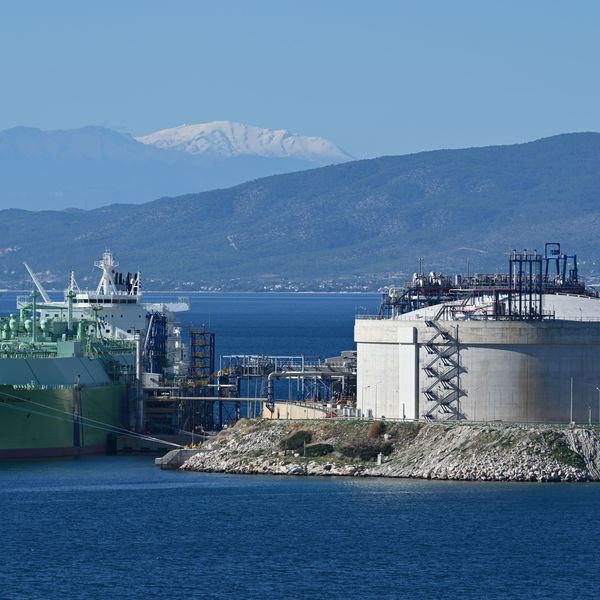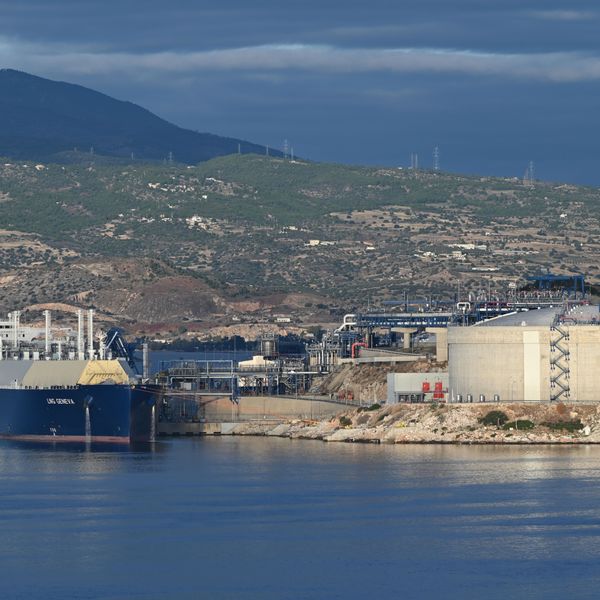The price of Brent Crude, the world's most traded category of oil, dipped slightly today after reaching a nine-month high earlier in the week. Overall, US gas prices have continued to surge despite declining demand, and the airwaves and national media are flooded with worrying headlines about consumers furious over out-of-control prices.
"On Tuesday," according to reporting by McClatchy's Kevin G. Hall, "Oil [prices] rose past $106 a barrel and gasoline averaged $3.57 a gallon -- thanks again in no small part to rampant financial speculation on top of fears of supply disruptions."
Hall's report highlights the fact that despite rising prices at US gas pumps, demand in the US was so low it has "become a net exporter of gasoline, unable to consume all that it generates."
This fact contradicts the familar refrain from GOP politicians and operatives who claim that a 'Drill Everywhere' agenda would solve US energy woes or lead to lower prices for consumers.
Hall acknowledges that the "ostensible reason" for the climb in prices is accurately ascribed to increased tensions and fears about a "military confrontation with Iran," but writes that the deeper cause is that financial speculators are "piling into the market, torquing the Iranian fear factor into ever-higher prices." He continues:
... oil's price shot up because it trades in financial markets, where Wall Street firms and other big financial players dominate the trading of oil, even though they have no intention of ever taking possession of the oil whose contracts they are trading. [...]
And he quotes Fadel Gheit, a 30-year veteran of energy markets and an analyst at Oppenheimer & Co., who is convinced "oil prices are inflated" due to speculation, saying:
"Speculation is now part of the DNA of oil prices. You cannot separate the two anymore. There is no demarcation."
So how much has speculation inflated prices? Hall writes:
Defining what percentage of today's high oil and gasoline prices is due to excessive speculation, driven by Iran fears, is something of a guessing game.
"I put the Iran security premium at about $8 to $10 (a barrel) at this point, which still puts crude at about $90 or $95," said John Kilduff, a veteran energy analyst at AgainCapital in New York.
Historically, financial speculators accounted for about 30 percent of oil trading in commodity markets, while producers and end users made up about 70 percent. Today it's almost the reverse.
The fear premium is the froth above what prices would be absent fears of a supply disruption -- somewhere in the $80 to $85 range for a barrel of crude oil. It means that even with the extra cost put on oil from Iran fears, prices are at least another $10 higher than what demand fundamentals would dictate.
Why? Financial speculators.
What should the price of oil be if left to conventional supply and demand market fundamentals? Canada's the largest supplier of imported oil to the United States, which now actually produces more than half of the oil it consumes. Production and delivery costs for a barrel of oil from Canada are about $75 a barrel. The market-fundamentals cost for a barrel of oil is in that ballpark; above that, speculation sets the prices.
"It's as simple as that," said Gheit, who has testified before Congress and called for regulatory limits on speculation in commodities markets.
Historically, financial speculators accounted for about 30 percent of oil trading in commodity markets, while producers and end users made up about 70 percent. Today it's almost the reverse.
Because speculators dominate the market, writes Hall, their predictions of higher oil prices -- which were rampant on Tuesday -- can make their "prophecies self-fulfilling."
"These people are not there to be heroes. They are there to make money. It's our fault because we are allowing them to do that," said Gheit. "Obviously these people are very strong, and the financial lobby is the strongest of any single lobby. I've been in this business 30 years, and I can tell you I think this is smoke and mirrors."
Read more here: https://www.mcclatchydc.com/2012/02/21/139521/once-again-speculators-be...
***
That speculators have a huge impact on oil and gasoline prices is not news to anyone paying attention to the subject over the years, but it is an aspect that most media outlets rarely mention -- even when spiking gasoline prices dominate the news cycle. And legislatively, efforts to bring damaging speculative practices under control have continually stalled in Congress.
Last year, Sen. Sanders introduced a bill titled the "End Excessive Oil Speculation Now Act of 2011 (pdf)", which would force the Chairman of the CFTC (Commodity Futures Trading Commission ) to impose strict limits on the amount of oil speculators can trade in the commodity and futures markets. The bill found little traction.
Here is Sanders talking about oil speculation on MSNBC's the Ed Show in August of 2011:
###



